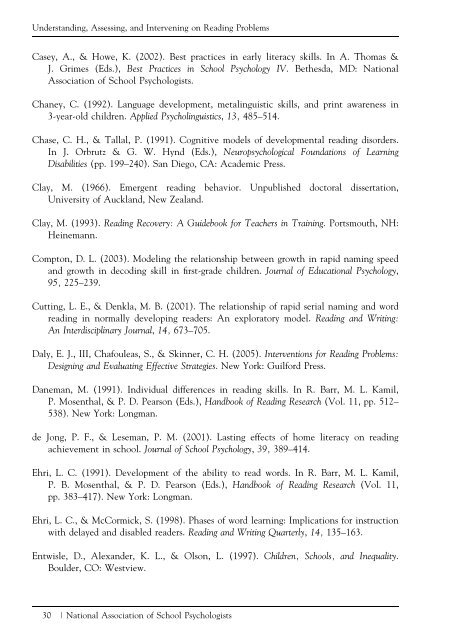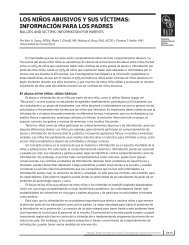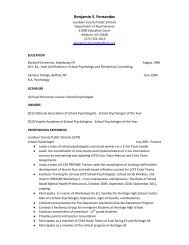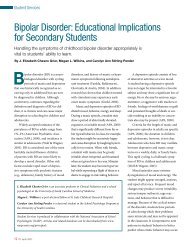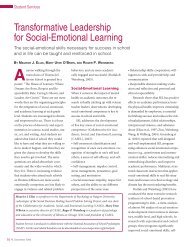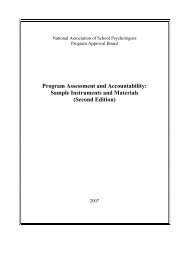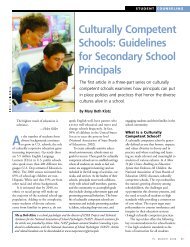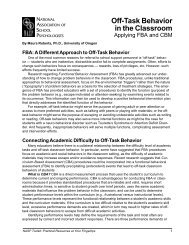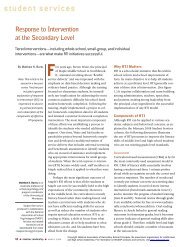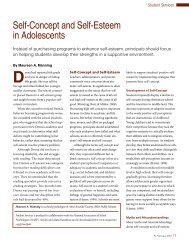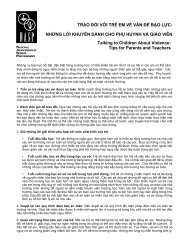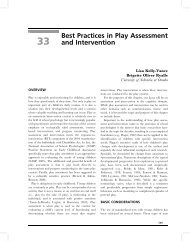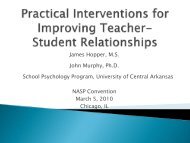Chapter 1 - National Association of School Psychologists
Chapter 1 - National Association of School Psychologists
Chapter 1 - National Association of School Psychologists
Create successful ePaper yourself
Turn your PDF publications into a flip-book with our unique Google optimized e-Paper software.
Understanding, Assessing, and Intervening on Reading Problems<br />
Casey, A., & Howe, K. (2002). Best practices in early literacy skills. In A. Thomas &<br />
J. Grimes (Eds.), Best Practices in <strong>School</strong> Psychology IV. Bethesda, MD: <strong>National</strong><br />
<strong>Association</strong> <strong>of</strong> <strong>School</strong> <strong>Psychologists</strong>.<br />
Chaney, C. (1992). Language development, metalinguistic skills, and print awareness in<br />
3-year-old children. Applied Psycholinguistics, 13, 485–514.<br />
Chase, C. H., & Tallal, P. (1991). Cognitive models <strong>of</strong> developmental reading disorders.<br />
In J. Orbrutz & G. W. Hynd (Eds.), Neuropsychological Foundations <strong>of</strong> Learning<br />
Disabilities (pp. 199–240). San Diego, CA: Academic Press.<br />
Clay, M. (1966). Emergent reading behavior. Unpublished doctoral dissertation,<br />
University <strong>of</strong> Auckland, New Zealand.<br />
Clay, M. (1993). Reading Recovery: A Guidebook for Teachers in Training. Portsmouth, NH:<br />
Heinemann.<br />
Compton, D. L. (2003). Modeling the relationship between growth in rapid naming speed<br />
and growth in decoding skill in first-grade children. Journal <strong>of</strong> Educational Psychology,<br />
95, 225–239.<br />
Cutting, L. E., & Denkla, M. B. (2001). The relationship <strong>of</strong> rapid serial naming and word<br />
reading in normally developing readers: An exploratory model. Reading and Writing:<br />
An Interdisciplinary Journal, 14, 673–705.<br />
Daly, E. J., III, Chafouleas, S., & Skinner, C. H. (2005). Interventions for Reading Problems:<br />
Designing and Evaluating Effective Strategies. New York: Guilford Press.<br />
Daneman, M. (1991). Individual differences in reading skills. In R. Barr, M. L. Kamil,<br />
P. Mosenthal, & P. D. Pearson (Eds.), Handbook <strong>of</strong> Reading Research (Vol. 11, pp. 512–<br />
538). New York: Longman.<br />
de Jong, P. F., & Leseman, P. M. (2001). Lasting effects <strong>of</strong> home literacy on reading<br />
achievement in school. Journal <strong>of</strong> <strong>School</strong> Psychology, 39, 389–414.<br />
Ehri, L. C. (1991). Development <strong>of</strong> the ability to read words. In R. Barr, M. L. Kamil,<br />
P. B. Mosenthal, & P. D. Pearson (Eds.), Handbook <strong>of</strong> Reading Research (Vol. 11,<br />
pp. 383–417). New York: Longman.<br />
Ehri, L. C., & McCormick, S. (1998). Phases <strong>of</strong> word learning: Implications for instruction<br />
with delayed and disabled readers. Reading and Writing Quarterly, 14, 135–163.<br />
Entwisle, D., Alexander, K. L., & Olson, L. (1997). Children, <strong>School</strong>s, and Inequality.<br />
Boulder, CO: Westview.<br />
30 <strong>National</strong> <strong>Association</strong> <strong>of</strong> <strong>School</strong> <strong>Psychologists</strong>


